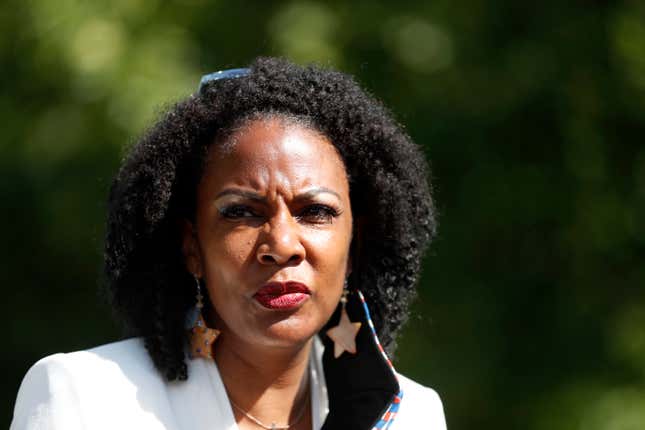
More than six years after the Ferguson Uprisings brought a racial reckoning to the St. Louis metropolitan area—and the nation—St. Louis elected its first Black female mayor Tuesday. Tishaura Jones, the city’s treasurer, ran on a commitment to racial justice and promised to bring “fresh air” to the city, according to the New York Times.
Jones won her race with 52 percent of the vote against her opponent Alderwoman Cara Spencer’s nearly 48 percent. Jones will be sworn in on April 20.
During her victory speech, Jones said that she would take on racism, homophobia, transphobia, xenophobia or religious intolerance, adding, “I will not stay silent when I spot any injustice.”
Per the Times, Jones has a full plate:
When Ms. Jones takes office, she will face a list of challenges, including a rise in violence. Last year, the city saw its highest homicide rate in 50 years with 262 murders, five fewer than the record set in 1993. There have been 46 homicides so far this year, according to the St. Louis Police Department.
The city’s jail has also seen a growing number of disturbances in recent months, and on Sunday, inmates broke windows, set a fire and threw items onto the street below. A similar episode took place in February.
Ms. Jones campaigned on improving the city’s response to the pandemic and pursuing policies to improve its public health infrastructure. Mobile and stationary vaccination clinics would also be established under her lead.
As the city is promised more than $500 million from the American Rescue Plan Act, Ms. Jones also pledged relief for small businesses and those in need of rental and mortgage assistance.
She ran for mayor in 2017 and was considered a frontrunner then, but the race drew national headlines of Jones’ view that she lost her race because too many men who had no chance to win stayed in the race, syphoning critical votes from her.
Here is how The Root covered her comments four years ago:
The other main black candidates—Alderman Jeffery Boyd (who received 2.7 percent of the vote); Alderman Antonio French (15.8 percent), who shot to national stardom as one of the main must-follows on Twitter during Ferguson in 2014; and, finally, Lewis Reed, president of the Board of Alderman (18.3 percent), who had lost the mayor’s race in 2014 by almost 10 percent—needed to think of the collective good instead of their own political egos. Had just one of these men dropped out of the race, St. Louis would likely have elected its first African-American woman as mayor. Yet they persisted.
“I’m really disappointed that the ego, patriarchy and sexism won the day yesterday,” Jones told The Root. “When all the black candidates met before filing closed, only the black women decided to work together and support each other. When will we come together for the common good? Even if all the men in the race got together and decided to go with one male candidate, we would have had a much different outcome.”
Well, sexism didn’t win this time. Black Girl Magic prevailed.

